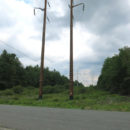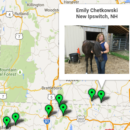Over the last two mornings, we heard from residents along the proposed route of a natural gas pipeline in Massachusetts and New Hampshire. Many people brought up concerns about the pipeline’s possible effects on the environment, property values and safety.
PIPELINE ROAD TRIP PART 1: Along Kinder Morgan’s Proposed Route, A Fear Of Disaster — And Frustration With Debate’s Tone
PIPELINE ROAD TRIP PART 2: For Many Along Pipeline Route, An Issue Of Jobs, Environment And Money
So I sat down with Allen Fore, a representative of the company Kinder Morgan, which is proposing the line. I wanted to put some of those concerns before him.
Fore emphasizes that the company has operated other pipelines in New England for decades.
Listen to our conversation by clicking the audio player above.











